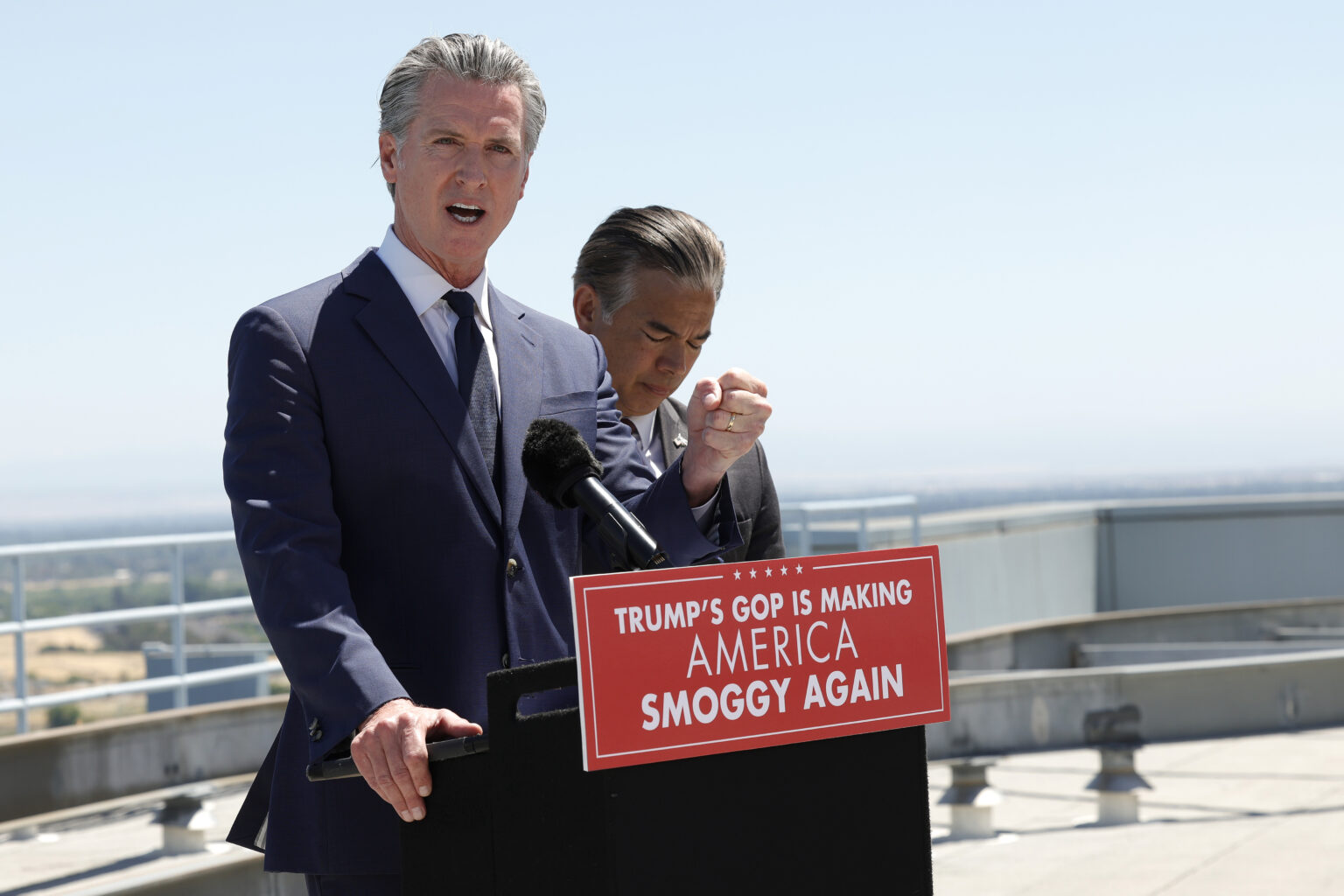Tensions Escalate Between California Governor and U.S. President Amid Rising Civil Unrest
LOS ANGELES – The strained rapport between California’s Governor Gavin Newsom and President Donald Trump has reached a critical juncture, with recent exchanges highlighting deepening political discord. On Monday, Trump publicly suggested that Newsom should face arrest, a statement that Newsom condemned as a dangerous move toward authoritarianism.
This confrontation unfolded amidst a surge of federal military deployment in Los Angeles, despite opposition from Newsom, as both leaders exchanged sharp criticisms. Trump launched a series of personal attacks on Newsom, labeling him “grossly incompetent” and criticizing his handling of state affairs. When questioned about a threat from his border security chief, Tom Homan, to detain the governor, Trump responded, “I would do it if I were Tom,” expressing approval without citing any specific legal grounds.
Trump’s remarks drew swift rebuke from Newsom, who characterized the president’s threats as unprecedented in modern American politics. “That’s not something we see in a democracy; it’s characteristic of authoritarian regimes,” Newsom stated in an interview, emphasizing the gravity of such rhetoric from a sitting president.
A Fractured Relationship Marked by Political and Ideological Clashes
The ongoing feud is emblematic of broader frustrations among Democratic leaders, who view Trump’s recent actions as increasingly antidemocratic. Throughout his tenure, Newsom has oscillated between defiance and diplomacy-standing as a vocal critic during Trump’s first term, welcoming him during a visit to California in his second, and maintaining a complex, often cordial, back-channel relationship.
However, recent events have pushed this relationship to a breaking point. Newsom described Trump as “unrestrained” and “unhinged,” criticizing his approach to governance, especially his efforts to undermine congressional oversight and threaten judicial independence. The latest escalation was triggered by a series of federal immigration raids in Los Angeles on Friday, which resulted in the detention of 44 individuals, including minors.
Federal Intervention Amid Civil Unrest
The federal government’s response to the protests that erupted in Los Angeles has been contentious. Following the immigration raids, protests intensified, with demonstrators blocking major highways and clashing with law enforcement. Law enforcement officials reported objects being hurled at officers and vehicles set ablaze, creating scenes reminiscent of other major urban unrest across the country.
In a phone call late Friday, Newsom attempted to reassure Trump that local authorities had control over the protests, but the president’s focus remained on escalating federal intervention. According to sources familiar with the call, Trump did not inquire about the law enforcement response but instead discussed trivial topics, seemingly more interested in framing the situation as a crisis requiring federal action.
By Saturday evening, Trump authorized the deployment of the National Guard to Los Angeles, a move announced during prime evening hours to deter further unrest. Trump justified the decision by citing images of violence and destruction, comparing the situation to other recent protests, and framing his intervention as necessary to restore order.
The Deployment of Military Forces and Political Rhetoric
In a dramatic escalation, about 700 active-duty Marines from Camp Pendleton were dispatched to Los Angeles late Monday night, citing threats to federal facilities and personnel. Newsom condemned this move, calling it “un-American” and warning against deploying troops against American citizens. “Marines have served honorably in defense of democracy worldwide; they should not be used against their own countrymen,” he stated on social media.
Meanwhile, Trump continued to frame his actions as essential for public safety, claiming that without federal intervention, Los Angeles would descend into chaos akin to the riots following George Floyd’s death. He accused local authorities of being too politically correct and praised his own role in preventing catastrophe, suggesting that Newsom’s opposition was motivated by political calculation.
Unclear Legal Grounds and Growing Political Tensions
Despite Trump’s support for the idea of arresting Newsom, he offered no specific allegations or evidence of criminal conduct. When asked about the basis for such a drastic measure, Trump implied that Newsom’s poor management of California was sufficient reason, comparing his governance to that of President Biden’s broader national policies.
White House officials later indicated that Trump’s threats might be serious, emphasizing that no one is above the law if they obstruct federal law enforcement efforts. This stance underscores the increasingly combative tone of the federal-state relationship, especially as the 2024 presidential race approaches.
Political Implications and Future Outlook
Observers note that the adversarial dynamic between Newsom and Trump has long been predictable, rooted in contrasting visions for America’s future. Political strategist and former Obama adviser David Axelrod remarked that both figures are “improvisational politicians” adept at reading the political climate, but that Newsom’s ambitions for the presidency make this confrontation particularly significant.
“Newsom’s response to these provocations will be telling,” Axelrod said. “He needs to balance maintaining his political integrity with the realities of national ambitions, especially when the sitting president is engaging in provocative actions like deploying military forces to a major city.”
Newsom expressed concern that Trump’s threats mark a “point of no return,” but reaffirmed his commitment to uphold constitutional principles. “Even in the face of threats, I remain dedicated to protecting the rights of Californians and resisting authoritarian tendencies,” he declared.
As the situation continues to evolve, the nation watches closely, recognizing that these tensions could have lasting implications for American democracy and the balance of power between federal and state governments.

